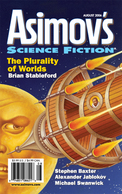
| Editor: | Sheila Williams |
| Issue: | Volume 30, No. 8 |
| ISSN: | 1065-2698 |
| Pages: | 144 |
The highlight of the non-fiction this issue is a surprisingly good column from James Patrick Kelly on downloadable movies. I normally stay away from this sort of essay because either the assumptions are annoyingly gung-ho or the coverage of the technology is laughably bad, but Kelly does a great job of being interesting and informative even to someone who spends most of his time on-line. There's also a satisfyingly long book review column from Peter Heck, although I still don't trust him to tell me when a book is actually bad.
This issue is one of the occasional ones with a letter column, which I do appreciate. I wish more SF magazines had them.
Among the stories, Brian Stableford's tale of Elizabethan science fiction is the centerpiece, but my favorite was a warm-hearted and surprisingly good story of quiet spirituality by Ruth Nestvold.
"Dead Man" by Alexander Jablokov: The premise is another pass at the conceptual problems with uploaded consciousness. If personalities can be uploaded and live on in a computer existence, what if the process is interrupted and the body isn't killed? When the uploaded version is legally the person, what happens to the still-conscious body? Not a bad start, but the story didn't satisfy; there were some mildly interesting complications and one twist, but I never cared much about the characters and the take on uploading wasn't much different than many stories I've read before. (5)
"Feather and Ring" by Ruth Nestvold: A game designer at a crossroads in her life gets away from a meeting in Taiwan to try to reduce her stress and finds that the person she meets at a local shrine helps more than she could have imagined. This is the sort of goddess that I could believe in. Nestvold's characterization and focus on the actions the characters take to help themselves gives it just the right balance between the supernatural and the human. Not a clear fantasy story, just a nice portrayal of some gentle nudging. (8)
"In the Abyss of Time" by Stephen Baxter: I've yet to read one of Baxter's novels, but at least the short fiction of his I've read is trying too hard to build worlds and doesn't have enough story. This is a particular egregious example; the main character, a reporter, exists solely as a vehicle for the exploration of the far depths of the cosmological future, an exploration that is little more than an extended infodump containing no characters worthy of the name. I suppose this could be an interesting essay; as a story, I simply didn't care. (3)
"Crunchers, Inc." by Kristine Kathryn Rusch: I'm building an association between Rusch and reliably good SF with strong characterization, and I'm going to have to start seeking out more of her writing. This is another enjoyable entry, following a line manager at an actuarial company in a future where actuaries drive the social fabric and distribution of everything worth happening. The dehumanizing effect of being forced into treating people as numbers, the perceived lack of better alternatives, and the amusingly pointed run-ins with a truly strange revolutionary group were all quite well-handled. This is a good bit of light satire with an upbeat ending. (7)
"Tin Marsh" by Michael Swanwick: Here's something of an inverse of the previous story, a horribly depressing tale of miners teamed together for so long that they loathe each other and the brutal games one starts playing with the other when they finally snap. Swanwick could have gone a couple ways with the story that might have saved it for me: social commentary on the dehumanizing effects of the structure the mining company put in place, or a survival story built on grim determination. This, with a miracle ending and an unbelievable bit of characterization tacked onto the end, I didn't buy at all. It went from depressing to stupid. (4)
"The Plurality of Worlds" by Brian Stableford: The novella of the issue basically lives and dies by its concept. A group of Elizabethan scientists succeed in building a rocket ship and set out to explore the ether, which they discover functions far closer to their scientific understanding than the real world but which is also inhabited by far, far more creatures than man. This is primarily an adventure story written in the mode of far earlier science fiction, where mankind discovers the universe is a much larger and more dangerous place than previously realized, adventures out into it, and has to reconcile faith, perception, and understanding with the true universe. I liked the alien presence riding along with the protagonist and the multi-cornered political intrigue, but I either missed the deeper thematic content or wish there were more of it. Interesting mainly because the world-view of the humans is nearly as alien as the world-view of the aliens and the interaction provides a different perspective on both. (6)
Reviewed: 2006-11-28